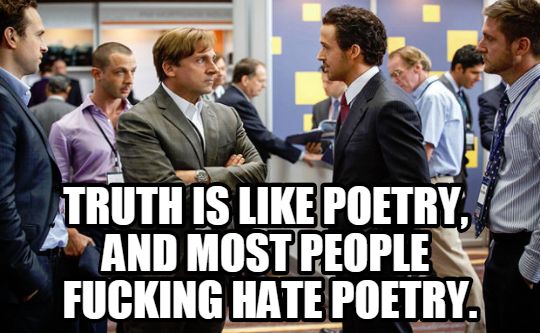Last night Jan & I saw the Big Short. It’s a roller coaster ride on the run up to the great global financial crisis of 2007 and 2008, generally acknowledged as the most frightening economic event since the events that triggered great depression.
The film is written by Michael Lewis, Adam McKay, and Charles Randolph, based on Lewis’ best selling nonfiction study “The Big Short.” It was directed by McKay and features a wonderful ensemble cast including Christian Bale, Steve Carell, Ryan Gosling, Karen Gillan, Marisa Tomei, and Brad Pitt, among others.
Rotten Tomatoes’ “consensus” summary tells us “The Big Short approaches a serious, complicated subject with an impressive attention to detail — and manages to deliver a well-acted, scathingly funny indictment of its real-life villains in the bargain.” Their critics’ give it a wild collective thumbs up of 87% approval, while their viewer’s consensus goes all the way to 90%.
They tell the story through the eyes of short traders who see the underlying instability that occurred when mortgaged-backed securities, essentially investment vehicles based upon bundled mortgages mutated into collateralized debt obligations, which started moving into esoteric manipulations and from there all the way into synthetic collateralized debt obligations, which had only the most tangental connection to the real estate that was supposed to be backing all the speculation.
I found it interesting from the get go that short traders, who by definition are morally compromised people, are the ones who see the inherent instability of the whole thing. It gives a black comedy turn to the film, which is followed all the way down. The film pauses every now and again when they turn to celebrities Selena Gomez, Anthony Bourdain, and Margot Robbie, playing themselves, to explain some of the arcana that drives the whole story. These are highly entertaining moments, and helpful.
I was curious about the factuality of a film that felt so convincing, and started digging around. And it seems economists or people who like to portray economists in the popular media divide along familiar lines.
Nobel prize winning economist Paul Krugman writes that “’The Big Short’ is based on the Michael Lewis book of the same name, one of the few real best-sellers to emerge from the financial crisis. I saw an early screening, and I think it does a terrific job of making Wall Street skulduggery entertaining, of exploiting the inherent black humor of how it went down.” He acknowledges some quibbles with the facts, mostly how there were more people who saw the problems as they emerged than the film suggests, and that the blame could go much deeper.
Digging around a bit I see those who dispute the facts as they’re presented in the film, usually by saying “yes, and,” although a few who simply jump to their “and:” that Fed policies were the real culprit. These commentators, largely published in Forbes and the various organs owned by Rupert Murdoch, including the Wall Street Journal, believed the real problem was that the market wasn’t really free, which, if it were, would have corrected the problems in double time. If only it were unfettered and not forced to include poor people (usually only hinting at the color of the poor people), all would be well.
The film itself answered that with the withering observation at its end that when the financial system is exposed once again for its weening excesses, endless grasping, and poisoned love of short term gain above all, they always blame the poor and the immigrants. Although the film adds in with the new wrinkle this time of including teachers.
Professor Krugman adds in a thought on this. “The thing to remember, when you see such attacks, is why they’re taking place. The truth is that the people who made “The Big Short” should consider the attacks a kind of compliment: The attackers obviously worry that the film is entertaining enough that it will expose a large audience to the truth. Let’s hope that their fears are justified.”
The movie is as foul mouthed as Wall Street really is. There is some nudity, and various sexual allusions that earn the movie an “R” rating.
If you want a black humor romp through the dark heart of Wall Street, you have your film.
I strongly recommend it.













